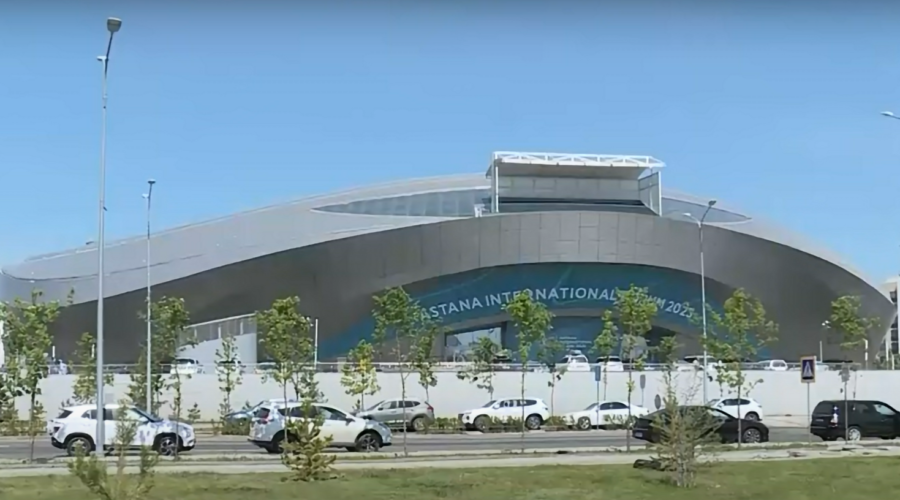Kazakhstan’s foreign policy represents a constant balance between the country’s traditional ties with Russia and its economic cooperation with China. But the Russian invasion of Ukraine has allowed Astana to start seeking opportunities to expand political ties with neighboring Central Asian states, as well as energy cooperation with the West.
On June 8, the former Soviet republic launched the Astana International Forum (AIF) where over 1,000 participants attempted to find solutions to the current global challenges. The event also helped Kazakhstan improve its positions in the global arena. The fact that the United Nations was the AIF’s strategic partner indicates that the Kazakh government aimed to increase its role of a significant regional actor.
Indeed, Kazakhstan is the largest economy in Central Asia, with a GDP of over $170 billion and highest GDP per capita in the region. The country accounts for 58 percent of trade turnover in Central Asia. Since the European Union is the former Soviet republic’s first trade partner, it is not surprising that Brussels, as well as individual EU members, seeks to increase its presence in the nation that has traditionally been in Russia’s geopolitical orbit.
Coincidently or not, no Russian representative participated the Astana International Forum. On the other hand, the EU Agriculture Commissioner Janusz Wojciechowski was one of the major guests. Could it be interpreted as a signal that for Kazakhstan a tense cooperation with the EU could soon have a priority over the country’s nominal alliance with Moscow?
Although some political figures in the Central Asian nation argue that Kazakhstan should join the EU, geography prevents Astana from setting such a political goal. Sandwiched between Russia and China, Kazakhstan does not seem to have an option but to continue implementing its decades-old “multivector foreign policy”.
“Ever since our independence, we have strived to contribute to international peace, security, and stability. Our multi-vector foreign policy has been indispensable in this regard”, Kazakhstan’s Deputy Foreign Minister Roman Vassilenko said on June 7.
Under the current geopolitical circumstances, both Russia and the Western powers seem to be satisfied with this Kazakh approach. The Kremlin, isolated from the West as a result of the Russian invasion of Ukraine, may not be able to count on Astana’s support regarding the war in the Eastern European country, but it can be sure that its nominal ally in the Collective Security Treaty Organization (CSTO) will not join Western sanctions against Moscow. On the other hand, Kazakhstan’s officials have repeatedly said that they will not allow Russia to use their county to evade sanctions.
More importantly, at this point the Central Asian nation does not intend to leave the Russian-dominated Eurasian Economic Union, quite aware that its membership in this supranational entity could have a positive impact on the Kazakh economy.
At the same time, Astana aims to strengthen its position in Central Asia, namely by participating in the construction of the Middle Corridor, also known as the Trans-Caspian International Transport Route. One of the major goals of this project is to connect China with the European Union via Kazakhstan, the Caspian Sea, Azerbaijan, Georgia, and Turkey. Therefore, preserving good relations with Beijing will undoubtedly remain one of Astana’s top priorities.
According to Vassilenko, Kazakhstan aims to have “mutually beneficial relations” with both China and Russia. But in order to avoid being treated as a “junior partner” in this game, Astana seems to be attempting to increase its political and economic ties with the EU as a counterweight to Moscow and Beijing. The problem, however, is that the European Union is too far, and Kazakhstan remains heavily dependent on Russia when it comes to the Central Asian nation’s oil exports to the West.
Although in the first quarter of 2023 Astana ramped up oil exports bypassing its northern neighbor, more than 80 percent of total oil exports from Kazakhstan still go through Russian pipelines. For that reason, Astana is unlikely to make any moves that would lead to deterioration of its relations with Moscow. Instead, it will seek to preserve relatively good ties with the Kremlin, but at the same time it will almost certainly accelerate the implementation of its diversification agenda.
Moreover, Kazakhstan is expected to strengthen political, economic and cultural ties with neighboring Turkic States – Kyrgyzstan and Uzbekistan. It is unlikely a pure coincidence that the leaders of the two countries – Sadyr Japarov and Abdulla Aripov – attended the Astana International Forum. Their presence at the event could be interpreted as a symbolic message that a cooperation with Bishkek and Tashkent – be it through bilateral relations, or through the Organization of Turkic States – will be among Astana’s major foreign policy priorities.
Thus, Kazakh authorities seem to have gotten an opportunity to benefit from the Russian preoccupation with the war in Ukraine, by reducing Moscow’s influence in the country and developing strong ties with other global and regional actors.
Image: Телеканал Хабар 24 / YouTube

